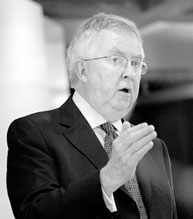Clark takes Harper to task
In his first public lecture at McGill on Jan. 31, former prime minister, former external affairs minister and current McGill professor Joe Clark spoke out against the Harper government's foreign policy for the first time.

Joe Clark talks foreign policy during a recent McGill address.
Owen Egan
"I have decided to offer these observations today, a year into the current government's mandate, because I believe Mr. Harper and his colleagues are moving away from central elements of the foreign policy that has been a strength of Canada under both Progressive Conservative and Liberal administrations," he said.
Mr. Clark delivered the lecture, "Canadian foreign policy: Reflecting a different North America," in his capacity as Professor of Practice for Public-Private Sector Partnerships at McGill's Centre for Developing Area Studies (CDAS).
Mr. Clark was Prime Minister from 1979 to 1980 and later served as Secretary of State for External Affairs from 1984 to 1991 under Brian Mulroney. He led the Progressive Conservative Party from 1976 to 1983 and again from 1998 to 2003. His experience as a foreign affairs minister and as a private citizen working in the developing world offers a unique perspective on Canada's international capacity and potential in foreign diplomacy.
Mr. Clark pointed out what he said were four recent "troubling departures" from Canada's traditional foreign policy: the Harper government's closeness to the foreign policy of the current administration in the United States; the absence of any priority given to issues concerning the developing world; the deterioration of Canada's influence on and relations with China; and the erosion of the influence of Canada's professional foreign service.
"The connection between the Harper government and the White House is obviously close. Taken alone that could be an advantage to Canada," Mr. Clark said, carefully reinforcing the notion that Canada has been most effective internationally when it has balanced its interests in the United States while working hard toward "an independent and innovative role in the wider world."
Citing a general decline in the authority of the United States, particularly in this post-Cold War era, and the increasing relative power of other societies like the European Union, China and India, Mr. Clark said that Canada's traditional multilateral skills – the ability to draw differences together, to form alliances, to generate trust and manage diversity – may now be more pertinent than ever. "We will not be a mega-power, but we could be a significant influence, if we respect and nourish our broadly based multilateral reputation."
The day after Mr. Clark's speech, McGill made the headlines again when Bloc Québecois leader Gilles Duceppe declared his support for beleaguered Parti Quécois leader André Boisclair after a speech to students. In his address, Duceppe lauded McGill for its progress on francophone rights, adding that even if Quebec were to separate, the university would be respected and preserved, as it would be "a plus to a sovereign Quebec."

